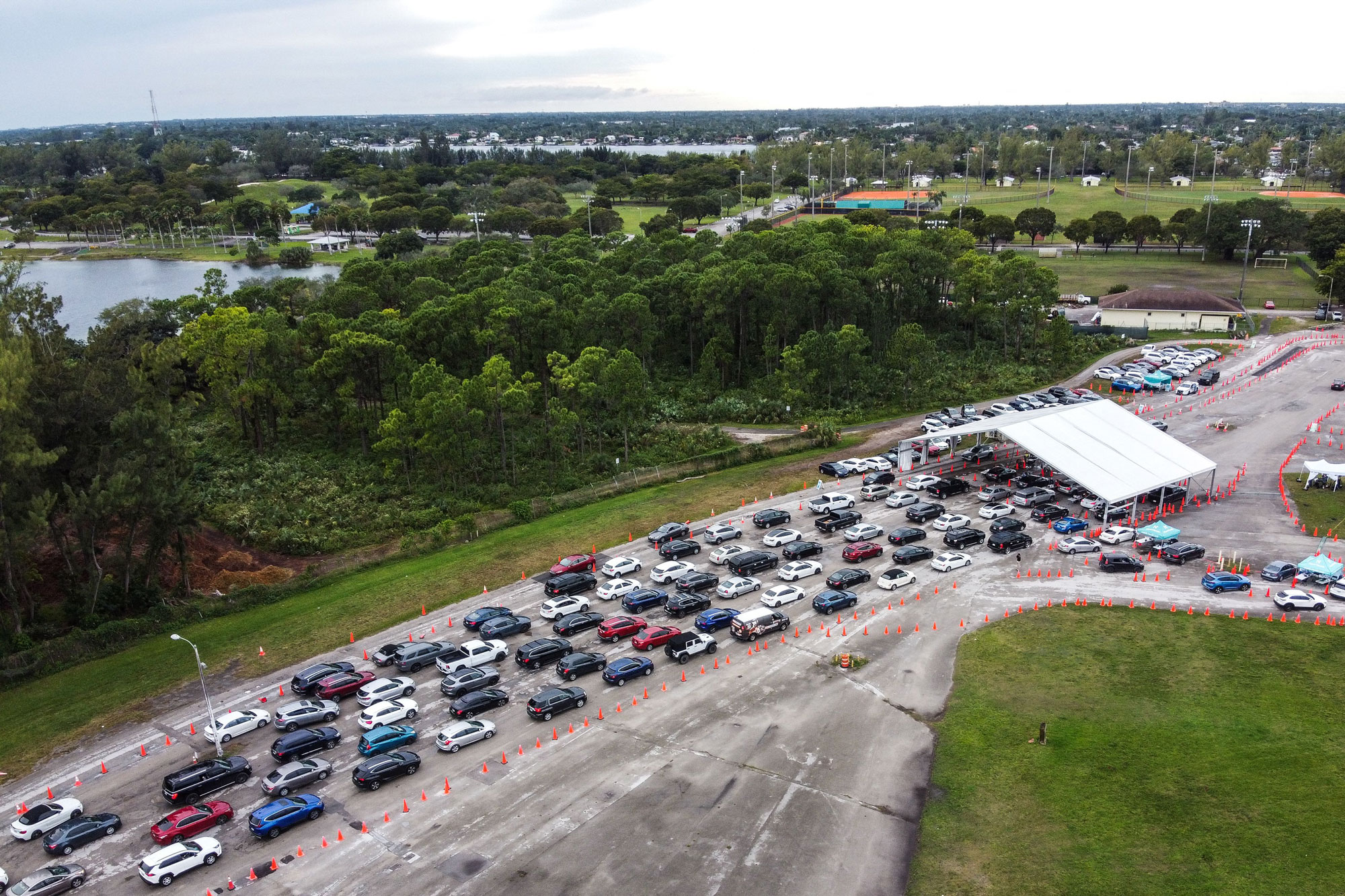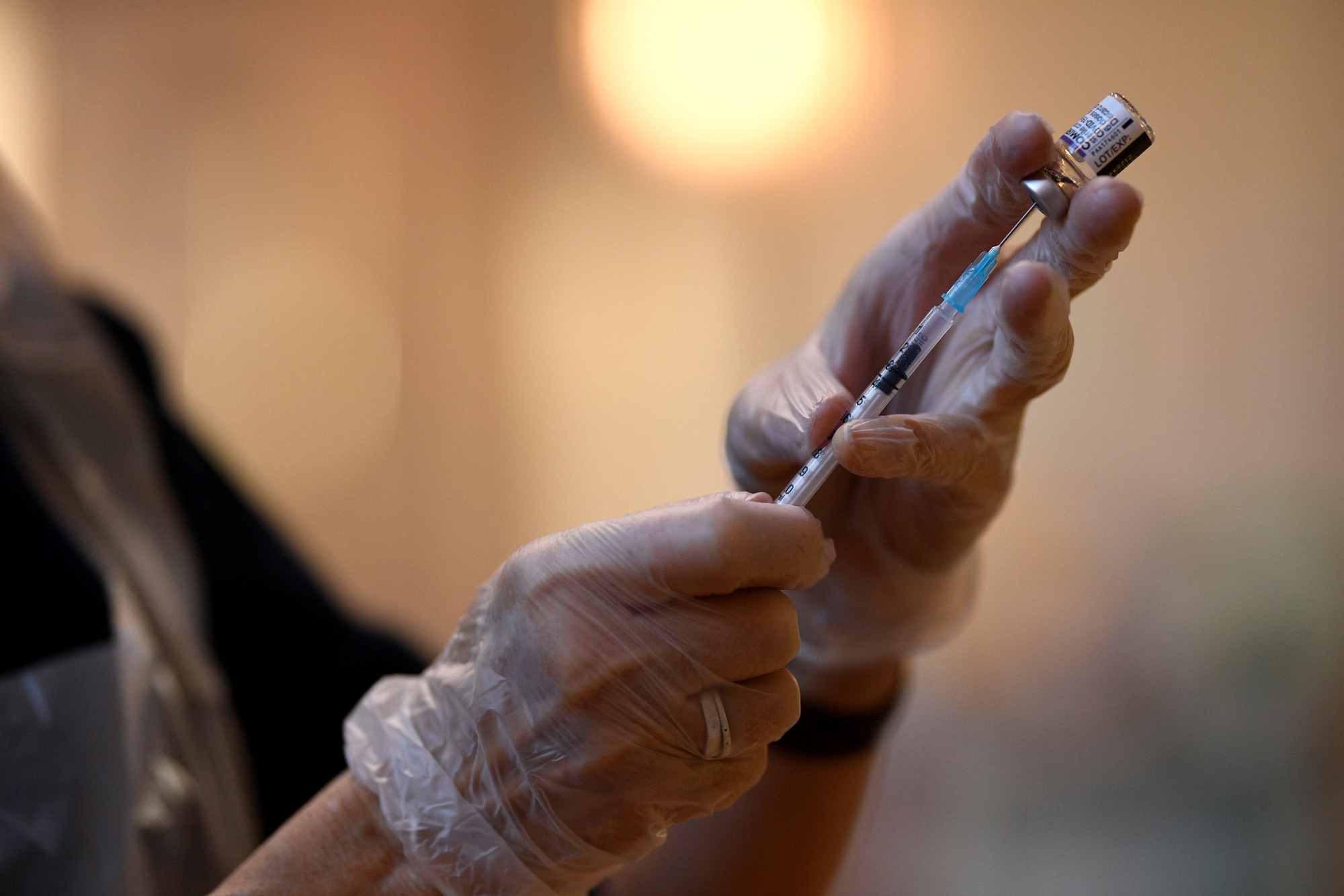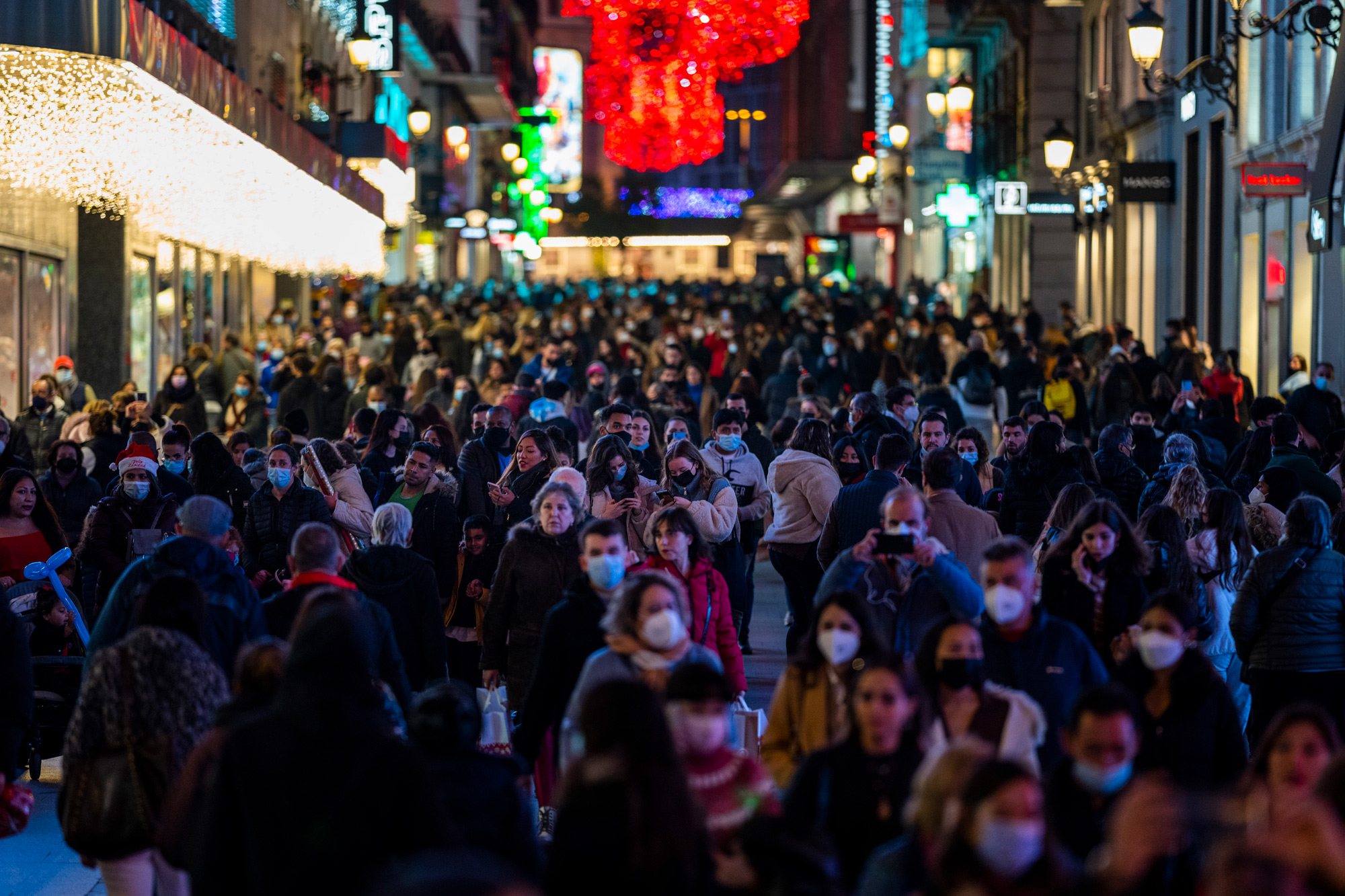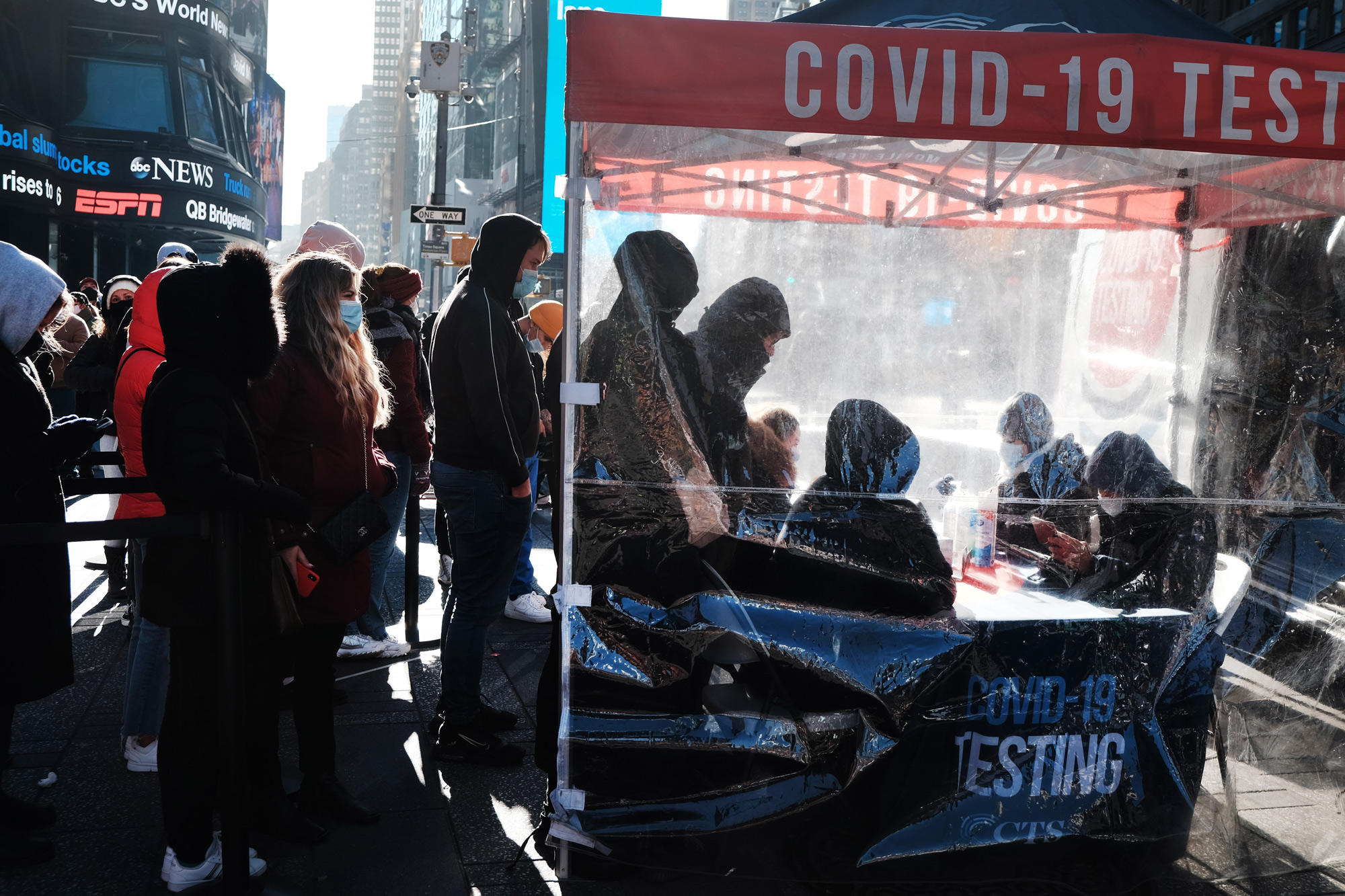
South Dakota is the 50th state to identify a case of the Omicron variant. It’s been 22 days since Omicron was first detected in the US.

Omicron has now been detected in every US state
From CNN’s Paul Murphy

The Covid-19 Omicron variant has been identified in every US state, as well as in Washington, DC, and Puerto Rico, according to public statements from hospital systems and state officials in their respective states.
It’s been 22 days since the US detected its first case of Omicron.
South Dakota was the 50th state it was detected in.
Top scientific researcher says South Africa has passed the peak of its Omicron outbreak
From CNN’s Hamilton Wende and Niamh Kennedy
South Africa has passed the peak of its Omicron outbreak, according to one of the country’s top scientific researchers.
Ridhwaan Suliman, senior researcher at the South African Council for Scientific and Industrial Research, told CNN on Wednesday that the country has “surpassed the peak of the Omicron wave now, driven by the significant decline in the populous province and epicenter, Gauteng.”
This was echoed by one of the country’s top scientists, Dr. Michelle Groome of the National Institute for Communicable Diseases, who told a media briefing earlier on Wednesday that all indications show “that we’ve surpassed the peak of infections in Gauteng.”
Most other provinces in the country have also passed their peaks, Suliman added
National Chair of the South African Medical Association Dr. Angelique Coetzee, who was one of the first doctors to treat patients with Omicron, told CNN’s New Day on Monday that the country was “over the curve,” highlighting that Gauteng’s numbers were “much lower.”
Suliman characterized the country’s fourth wave as a “steeper wave,” that was “significantly shorter” than those prior, saying in a tweet it took “about half the number of days to reach the peak compared with previous waves in South Africa.
There was a 20.8% decrease in the number of new Covid-19 cases detected in South Africa as of Saturday, according to the NICD’s epidemiology brief published Wednesday.
According to Suliman, although test positivity remains “still high at 29.8%,” the fact the figure is decreasing confirms “the decline in infections is real and not a testing artifact.”
On hospitalizations and deaths: South African vaccinologist Shabir Mahdi also told CNN on Wednesday that although there may be a “slight increase in deaths” the figure will be “substantially lower” than that experienced with the Delta variant.
Suliman also said that hospitalizations and deaths from this wave have proven to be “significantly lower relative to that experienced in previous waves.”
World Health Organization discussing whether to reclassify Alpha, Beta and Gamma variants
From CNN’s Virginia Langmaid
The World Health Organization is discussing whether to reclassify the Alpha, Beta and Gamma variants out of “variant of concern” status as the Delta and Omicron variants now make up more than 97% of variants sequenced, WHO Technical Lead for Covid-19 Maria van Kerkhove said Wednesday.
“Since Oct. 20, less than 0.1% of the sequences uploaded to platforms like GISAID have been Alpha, Beta and Gamma. Ninety-six percent of the sequences available are still Delta, and about 1.6% of sequences that have been shared in recent weeks is Omicron. We definitely see increasing growth rates of Omicron where it’s being detected, and it’s now been recorded in more than 106 countries to date,” Van Kerkhove said in a media briefing.
“We have actually been having some discussions about whether we need to reclassify Alpha, Beta and Gamma to change them from being called a variant of concern to maybe a variant of interest, or they become variants of monitoring strictly because they’re not circulating anymore, and because Delta has out-competed those variants,” she said.
“The discussion that we’ve been having is how we reclassify them, and once you have a variant of concern, how do you reclassify it as something else when in fact the properties of that variant are really what allowed us to classify it as a variant of concern?”
Currently, the WHO has identified five variants of concern and two variants of interest. Van Kerkhove said the Omicron variant is unlikely to be the last variant of concern of the pandemic.
“The virus is changing. You’ve been hearing us say that Delta would not be the last variant of concern that we would speak about. Omicron is likely not going to be the last variant of concern that you hear us speak about as well,” she said.
Van Kerkhove said the virus is likely to eventually become endemic, but the world is not there yet.
“It is a respiratory pathogen, as you know, so we expect to see some kind of seasonal variation, you know, just due to behavioral factors, but we haven’t seen that yet. This virus thrives wherever we allow it. And we don’t get that reprieve in those summer months or certain times of the year,” she said.
“We expect to see flareups. It will depend on how big those outbreaks are as we go forward, but they will occur in under-protected populations, people who don’t have vaccine and people who are, don’t yet have their full dose of vaccine. So I think there is some understanding of where this virus is going. But we remain humble to it because I think it still has quite a few tricks up its sleeve,” she added.
Uneven distribution means booster programs could “prolong” pandemic, WHO director-general says
From CNN’s Virginia Langmaid

Unbalanced Covid-19 vaccine distribution around the world means that booster programs in high-income countries could prolong the pandemic by leaving poorer countries unvaccinated, World Health Organization Director-General Tedros Adhanom Ghebreyesus said Wednesday.
“It’s frankly difficult to understand how a year since the first vaccines were administered, three in four health workers in Africa remain unvaccinated,” Tedros said in a media briefing.
“While some countries are now rolling out blanket booster programs, only half of WHO’s member states have been able to reach the target of vaccinating 40% of their populations by the end of the year, because of distortions in global supply. Enough vaccines were administered globally this year that the 40% target would have been reached in every country by September if those vaccines had been distributed equitably,” he continued.
“About 20% of all vaccine doses administered every day are currently being given as boosters, or additional doses. Blanket booster programs are likely to prolong the pandemic rather than ending it by diverting supply to countries that already have high levels of vaccination coverage, giving the virus more opportunity to spread and mutate,” Tedros said.
Tedros has previously called for a moratorium on booster doses worldwide, and Wednesday referenced a new statement from WHO examining the use of booster doses worldwide.
“Today, the WHO strategic advisory group of experts on immunization, or SAGE, is issuing an interim statement on booster doses. SAGE concluded that the focus of immunization must remain on decreasing deaths and severe disease and expressed concern that blanket booster programs will exacerbate vaccine inequity,” Tedros said.
In this statement, the organization cited a preprint study from Mid-November, showing that when studied together, the Pfizer/BioNTech, Moderna, Johnson & Johnson and AstraZeneca vaccines saw vaccine effectiveness against severe Covid-19 decrease by about 8% over six months.
In people over age 50, the study showed a decrease in effectiveness of 10% against severe disease after six months. WHO called this a “minimal to modest” reduction in efficacy, but said the Omicron variant could change the situation.
“It’s important to remember that the vast majority of hospitalizations and deaths are in unvaccinated people, not unboosted people. And we must be very clear that the vaccines we have, remain effective against both the Delta and Omicron variants,” Tedros said.
The statement said in the interest of equity, the focus inside countries should be on “improving coverage of the primary vaccination series in high risk populations as the top priority use of vaccine doses.”
The WHO and SAGE statement also noted that 126 member countries have recommended some form of booster or additional vaccination, mostly high- and middle-income countries. “In several of these countries which are administering booster doses the coverage rates for complete primary vaccination are below 30%,” the statement said.
Spain set to require face masks outdoors again following Omicron rise
From CNN’s Al Goodman in Madrid

Spain is set to reimpose a nationwide requirement to wear face masks outdoors, according to a statement from the prime minister’s office on Wednesday. The office of Prime Minister Pedro Sanchez said he will convene a cabinet meeting on Thursday to approve the measure.
The country previously ended outdoor mask requirements in June, but wearing masks remains mandatory in crowded outdoor spaces and public indoor spaces.
The announcement comes as the prime minister meets on Wednesday afternoon with the presidents of Spain’s 17 regional governments to discuss pandemic measures and the rise of the Omicron variant.
Spain registered its highest daily number of new Covid-19 cases since the start of the pandemic, with 49,823 cases recorded in the past day, the country’s health ministry said late Tuesday, in the latest available figures. The Ministry said, in a separate report, “at the present time, the data drawn from sequencing of specific PCR indicates that there’s a rapid substitution of the Delta variant by the Omicron.”
Germany to require negative PCR tests for travelers arriving from UK, southern African countries
From CNN’s Chris Stern and Fred Pleitgen
Germany will soon require negative PCR tests from travelers arriving from “areas of variants ofconcern,” which includes the United Kingdom, South Africa and other southern African nations, according to the German government website.
The government did not specify when the requirement will come into force.
Negative PCR tests taken within the last 48 hours will soon be required to enter Germany from all areas of concern, according to the government. The requirement will apply to all passengers ages 6 and up, as well as for passengers transiting through Germany.
The government’s list of “areas of variants of concern” changes continuously, but as of this week includes Botswana, Eswatini, Lesotho, Malawi, Mozambique, Namibia, South Africa, the United Kingdom and all British Overseas Territories, and Zimbabwe.
New York City has been conducting around 170,000 Covid-19 tests per day, health official says
From CNN’s Laura Ly

New York City has been conducting around 170,000 Covid-19 tests per day recently, according to Dr. Ted Long, Executive Director of the NYC Covid-19 Test & Trace Corps.
The city’s Test & Trace Corps is responsible for the New York City’s Covid-19 testing operations, as well as contact tracing for all of the city’s residents.
The new record of 170,000 daily tests includes both PCR and antigen tests. New York City’s previous record of daily Covid-19 tests was around 120,000 per day, Long said.
Long added that with the addition of the seven city-run testing sites announced by Mayor Bill de Blasio Wednesday morning, the newest 30 city-run testing sites are anticipated to have an additional testing capacity of 24,600 tests per day, Long said. He added that he expected testing capacity to reach 180,000 daily tests in the coming days.
Biden receives another negative Covid-19 test after close contact with positive staffer
From CNN’s Kyle Blaine
President Biden on Wednesday tested negative for Covid-19, the White House announced, his second negative PCR test since coming into close contact with a staffer who later tested positive for the virus.
Biden tested negative on a PCR test on Monday, after receiving a negative rapid result on Sunday.
The White House revealed on Monday evening that a mid-level staff member who is “a close contact” of the President tested positive for Covid-19 on Monday morning after spending about 30 minutes “in proximity to the President on Air Force One” on Friday.
The US Centers for Disease Control and Prevention recommends testing five to seven days after close contact with someone with suspected or confirmed Covid-19.
FDA authorizes first antiviral pill for treatment for Covid-19
From CNN’s Ben Tinker, Jamie Gumbrecht and Amanda Sealy

The US Food and Drug Administration on Wednesday authorized the first oral antiviral treatment for Covid-19: Paxlovid, a pill made by Pfizer.
This is the first antiviral Covid-19 pill authorized for ill people to take at home, before they get sick enough to be hospitalized.
Paxlovid combines a new antiviral drug named nirmatrelvir and an older one called ritonavir.
Last week, Pfizer released updated results that showed the treatment cut the risk of hospitalization or death by 89% if given to high-risk adults within a few days of their first symptoms. If given within the first five days of symptoms, the efficacy was similar: 88%.
“Today’s authorization of PAXLOVID represents another tremendous example of how science will help us ultimately defeat this pandemic, which, even two years in, continues to disrupt and devastate lives across the world. This breakthrough therapy, which has been shown to significantly reduce hospitalizations and deaths and can be taken at home, will change the way we treat COVID-19, and hopefully help reduce some of the significant pressures facing our healthcare and hospital systems,” Pfizer Chairman and CEO Albert Bourla said in a statement . “Pfizer stands ready to begin delivery in the U.S. immediately to help get PAXLOVID into the hands of appropriate patients as quickly as possible.”
Some more background: In November, the Biden administration announced that it would purchase 10 million treatment courses for $5.295 billion. A five-day course of Paxlovid includes three pills given twice a day. President Biden said he was encouraged by the “promising data” from Pfizer and said the drug would “mark a significant step forward in our path out of the pandemic.”
He called Paxlovid a “potentially powerful tool in our fight against the virus, including the Omicron variant,” but stressed that getting vaccinated and receiving a booster shot remained “the most important tools we have to save lives.”
Separately, Merck has requested emergency use authorization for its antiviral pill, molnupiravir. It was narrowly recommended by FDA’s advisers in a 13-10 vote at the end of November after data showed it cut the risk of hospitalization or death by 30% among high-risk adults. This was lower than an earlier analysis suggesting that number could be around 50%. The FDA has not announced whether it will authorize the treatment.
Remdesivir, sold under the brand name Veklury, is the only antiviral approved by FDA for treatment of Covid-19. It’s given intravenously, not as a pill that can be taken at home.
Source: https://www.cnn.com/world/live-news/omicron-variant-coronavirus-news-12-22-21-intl/h_19f0bd09c2ac984f94dbb81e44a3ec1f
















